- Home
- Gayle Forman
Just One Day jod-1 Page 23
Just One Day jod-1 Read online
Page 23
“To find him.”
“I have to know. If something happened. I just need to find out.”
I brace myself for Melanie’s derision, for her to scoff or laugh at me. But she just considers what I’ve said. And when she says the next thing, it’s not snide so much as matter-of-fact: “Even if you find him. Even if he didn’t leave you on purpose, he can’t possibly live up to the person you’ve built him into.”
It’s not like the thought hasn’t occurred to me. I get that the chances of finding him are small, but the chances of finding him as I remember him are even smaller. But I just keep going back to what my dad always says, about how when you lose something, you have to visualize the last place you had it. And I found—and then lost—so many things in Paris.
“I know,” I tell Melanie. And it’s weird because I don’t feel defensive. I feel a little bit relieved because it almost seems like Melanie is worrying about me again. And also relieved because I’m not worrying about me. Not about this, anyhow. “I don’t know that it matters.”
Her eyes widen at that. Then she narrows them, looks me up and down. “You look different.”
I laugh. “No. I still look like me. It’s just this outfit.”
“It’s not the outfit,” Melanie says, almost harshly. “You just seem different.”
“Oh. Well . . . thanks?”
I look at Melanie, and for the first time, I notice how she seems. Which is utterly familiar. Like Melanie again. Her hair is growing out and is back to its natural color. She’s wearing cutoff shorts, a cute embroidered tee. No nose rings. No tats. No multicolored hair. No slutty-chic outfits. Of course, just because she looks the same has no bearing on whether she actually is the same. It hits me that Melanie’s year was probably was just as tumultuous as mine in ways that I didn’t understand, either.
Melanie is still staring at me. “I’m sorry,” she says at last.
“For what?” I ask.
“For forcing you to cut your hair in London when you weren’t ready. I felt so bad when you cried like that.”
“It’s okay. And I’m glad I did it.” And I am. Maybe he never would’ve stopped me had I not had the Louise Brooks hair. Or maybe he would’ve, and we would’ve exchanged actual names. I’ll never know. Once accidents happen, there’s no backtracking.
We both just stand there on the sidewalk, hands at our sides, unsure of what to say. I hear the neighbor kids yelp in the sprinklers. I think of me and Melanie when we were younger, on the high dive at the pool in Mexico. We would always hold hands as we jumped, but by the time we swam back up to the surface, we’d have let go. No matter how we tried, once we started swimming, we always let go. But after we bobbed to the surface, we’d climb out of the pool, clamber up the high-dive ladder, clasp hands, and do it again.
We’re swimming separately now. I get that. Maybe it’s just what you have to do to keep above water. But who knows? Maybe one day, we’ll climb out, grab hands, and jump again.
Twenty-nine
New York City
My parents want to drive me to JFK, but I’ve made plans to spend the day with Dee before I go, so they drop me off at 30th Street Station in Philadelphia. I’m going to take the train—my first train in a year—to Manhattan, and Dee will meet me at Penn Station. Tomorrow night, I catch my flight to London and then onward to Paris.
When my train is announced, we walk toward the platform. Dad taps his toes impatiently, visions of Maui golf courses dancing through his head. They leave on Monday. Mom just paces. Then when my train’s headlights are visible in the distance, she pulls a box out of her purse.
“I thought we weren’t doing presents this time.” Last year, there’d been the big dinner out, lots of little last-minute gadgets. Last night was more low-key. Homemade lasagna in the dining room. Both Mom and I pushed it around our plates.
“It’s less for you than for me.”
I open the box. Inside is a small cell phone with a charger and a plug adapter.
“You got me a new phone?”
“No. I mean yes. I mean, your old phone, we’ll unfreeze the plan when you get back. But this is a special quad-band phone. It definitely works in Europe. You just have to buy a . . . what are they called?” she asks Dad.
“SIM card.”
“Right.” She fumbles to flick open the back. “They’re very inexpensive, apparently. So you can get a local number anywhere you go and have a phone if you need one, and you can call us in an emergency or text us—but only if you choose to. It’s more for you, so you have a way to reach us. If you need to. But you don’t have to—”
“Mom,” I interrupt, “it’s okay. I’ll text you.”
“Really?”
“Well, yeah! And you can text me back from Hawaii. And does this thing have a photo function?” I peer at the camera. “I’ll send you pictures.”
“You will?”
“Of course I will.”
By the look on her face, you’d think I’d given her the present.
_ _ _
Penn Station is mobbed, but I find Dee right away, under the departure board, wearing a pair of lemon-lime paneled nylon shorts and a tank top with UNICORNS ARE REAL emblazoned on it. He scoops me up in a big hug.
“Where’s your suitcase?” he asks.
I turn around, show off the olive backpack I got from the Army-Navy surplus store in Philadelphia.
Dee whistles. “How’d you fit your ball gown?”
“It folds down really small.”
“I thought you’d have a bigger bag, and I told Mama we’d come back home before we went out exploring, so she made lunch.”
“I like lunch.”
Dee throws up his hands. “Actually, Mama planned a surprise party for you. Don’t tell her I told.”
“A party? She doesn’t even know me.”
“She thinks she does by how much I talk about you, and she’ll use any excuse to cook. My family’s coming, including my cousin Tanya. I told you about her?”
“The one who does hair?”
Dee nods. “I asked her if she’d do yours. She does white-girl hair too, works in a fancy salon in Manhattan. I thought maybe you could get a bob again, go all Louise Brooks. Look just like you did when you met. You gotta do something with that mop.” He fingers my hair, up, as usual, in a clip.
We take the subway all the way uptown, to the last stop on the train. We get out and transfer to a bus. I look out the window, expecting the rough-and-tumble streets of the South Bronx, but the bus passes a bunch of pretty brick buildings all shaded by mature trees.
“This is the South Bronx?” I ask Dee.
“I never said I lived in the South Bronx.”
I look at him. “Are you serious? I’ve heard you say a bunch of times that you’re from the South Bronx.”
“I only said that I was from the Bronx. This is the Bronx, technically. It’s Riverdale.”
“But you told Kendra you were from the South Bronx. You told her you went to South Bronx High School. . . .” I pause, remembering that first conversation. “Which does not even exist.”
“I left the girl to her own jumped conclusions.” He gives me a knowing smirk. He rings the bell to get off the bus. We exit onto a busy street full of tall apartment buildings. It’s not fancy, but it’s nice.
“You are a master pretender, D’Angelo Harrison.”
“Takes one to know one. I am from the Bronx. And I am poor. If people want to translate that as ghetto boy, that’s their choice.” He smiles. “Especially if they want to throw scholarship money my way.”
We arrive at a pretty brick building with cracked gargoyles hanging over the front entrance. Dee rings the buzzer—“so they know we’re coming”—and then we take one of those ancient caged-in elevators to the fifth floor. Outside the front door, he looks at me and tucks some strands of stray hair behind my ear.
“Act surprised,” he whispers and opens the door.
We step into a party, about a dozen peopl
e crowded into the small living room where there’s a BON VOYAGE ALLYSON sign tacked up over a table laden with food. I look at Dee, eyes wide in shock.
“Surprise!” he says, twinkling jazz hands.
Dee’s mother, Sandra, comes up to me and wraps me in a gardenia-scented bear hug. “He told you, didn’t he? That was the worst look of surprise I ever saw. My baby couldn’t keep a secret if was stapled to him. Well, come on, then, meet the folk, have some food.”
Sandra, introduces me to various aunts and uncles and cousins and gives me a plate of barbecued chicken and mac and cheese and some greens and sits me down at a table. “Now you hold court.”
Dee has pretty much told everyone about Willem, so they all have advice on how to track him down. Then they start peppering me with questions about the trip. How I’m getting there—a flight from New York to London and then on to Paris—and where I’m staying—a youth hostel in the Villette area Willem and I hung out in, twenty-five bucks a night for a dorm—and how I’ll get around—with the help of a guidebook, and I will brave the Metro. And they ask about Paris, and I tell them about what I saw last year, and they’re very interested to hear how diverse it was, about the sections that were full of Africans and then this starts a big debate about which African countries France colonized until someone goes for a map to figure it out.
While everyone pores over the atlas, Sandra comes up with a plate of peach cobbler. “I got you a little something,” she says, handing me a thin package.
“Oh, you shouldn’t—”
She waves away my objections like stale air. I open the package. Inside is a laminated map of Paris. “The man at the store said this would be ‘indispensable.’ It has all the subway stops and an index of major streets.” She opens the map to show me. “And D’Angelo and I spent so many hours looking at it, it has our good blessings coursing through it.”
“Then I’ll never get lost again.”
She folds the map up and puts it in my hands. She has the same eyes as Dee. “I want to thank you for helping my boy this year.”
“Me helping Dee?” I shake my head. “I think you have it the other way around.”
“I know exactly the way I have it,” she says.
“No, seriously. All Dee has done is help me. It’s almost embarrassing.”
“Stop with such nonsense. D’Angelo is both brilliant and blessed with the road life has taken him on. But it’s not been easy for him. In his four years of high school and one year of college, you are the first friend from school he’s ever talked about, much less brought home.”
“You two are talking about me, aren’t you?” Dee asks. He puts an arm around each of us. “Extolling my brilliance?”
“Extolling your something,” I say.
“Don’t either of you believe a word!” He turns around to introduce a tall, regal girl with a head full of intricate twists. “I was telling you about Tanya.”
We exchange hellos, and Sandra goes off to fetch some more cobbler. Tanya reaches out to free my hair from its clip. She fingers the ends and shakes her head, clucking her tongue the same disapproving way Dee so often does.
“I know. I know. It’s been a year,” I say. And then I realize it has. A year.
“Was it short or long?” Dee asks. He turns to Tanya. “You have to make her look just the same. For when she finds him.”
“If I find him,” I clarify. “It was to here.” I point to the base of my skull, where the stylist in London had cut my hair to last year. But then I drop my hand. “You know, though. I don’t think I want the bob.”
“You don’t want a haircut?” Tanya asks.
“No, I would love a haircut,” I tell her. “But not a bob. I want to try something totally new.”
Thirty
Paris
It takes approximately thirteen hours and six time zones for me to freak out.
It happens when I stumble into the arrivals hall of Charles de Gaulle airport. All around me, other passengers are being greeted by hugging relatives or drivers with signs. I’m not being met by anyone. No one is expecting me. No one is watching out for me. I know I have people out there in the world who love me, but right now, I’ve never felt so alone. I feel that flashing sign click on over my head, the one that used to read TOURIST. Only now it also reads WHAT HAVE YOU DONE?
I pull my backpack straps tighter around my chest, like they could hug me. I take a deep breath. I pick up one leg and put it in front the other. A step. I take another. And another. I pull out the to-do list I made on the plane. Number one: exchange money.
I go to one of the many foreign exchange bureaus and in halting French ask if I can exchange my dollars. “Of course. This is a bank,” the man behind the counter answers in French. I hand over a hundred dollars and am too relieved to bother to count the euros I get in return.
Next on the list: find youth hostel. I’ve mapped the route, a train to the city, then a Metro to the Jaurès stop. I follow the signs for the RER, the train to central Paris, but it turns out I have to take an airport train to get to the RER station, and I go the wrong way and wind up at a different terminal and have to double back around, so it takes me almost an hour just to get to the airport train station.
When I get up to the automated ticket machines, it’s like facing off against an enemy. Even with choosing English as the language, the instructions are bewildering. Do I need a Metro ticket? A train ticket? Two tickets? I feel that neon sign over my flash brighter. Now it says WHAT THE HELL HAVE YOU DONE?
I open the guidebook again to the section about getting into Paris. Okay, one ticket will get me into Paris and transfer to the Metro. I look at the map of the Paris Metro. The different lines knot together like snakes. Finally, I locate my stop, Jaurès. I trace the RER line to the airport to the transfer point and realize with a start that it’s at Gare du Nord. Someplace familiar, someplace to tie me to that day.
“Okay, Allyson, no way through it but through it,” I tell myself. And then I face the ticket machine, shoulders back, like we are competitors in a duel. I punch the touch screen, feed it a ten-euro note and then it spits me back some change and a tiny ticket. A small victory against an impassive opponent, but I am flush with satisfaction.
I follow the throngs to the gates, which work like the Tube gates, though it turns out, it’s much easier to get through them when you’re not lugging a giant suitcase. Ha! Another enemy foiled.
In the Metro/RER interchange beneath Gare du Nord, I get lost again trying to find the right Metro line, and then I misplace my little ticket, which you need not only to get out of RER but into the Metro. Then I almost get on the Metro going the wrong direction but figure it out right before the doors close and jump off. When I finally arrive at my stop, I’m completely exhausted and totally disoriented. It takes about fifteen minutes poring over the map just to figure where I am. I take a half dozen more wrong turns until I hit the canals, which is the first sign that I’m in the right area.
But I still have no idea where the hostel is, and I’m exhausted, frustrated, and near tears. I can’t even find the hostel. And I have an address. And a map. What in the world makes me think I can find him?
But then just when I’m about to lose it, I stop, look out at the canals, and I just breathe. And my panic subsides. Because this place, it feels familiar. It is familiar, because I’ve been here before.
I fold up my map and put it away. I breathe some more. I look around. There are the same gray bicycles. There are the same stylish women, teetering across the cobblestones on heels. The cafés, crowded, as though no one ever has to work. I take another deep breath, and a sort of sense memory takes over. And somehow I just know where I am. To the left is the park with the lake where we met Jacques and the Danes. To my right, a few blocks back, is the cafe where we had crêpes. I take the map out again. I find myself. Five minutes later, I’m at the youth hostel.
My room is on the sixth floor, and the elevator is out of order, so I walk up a winding stairway
. A guy with a tattoo of some sort of Greek god on his arm points out the breakfast room, the communal bathrooms (coed), and then my room, with seven beds. He gives me a lock and shows me where I can store my stuff when I go out. Then he leaves me with a bonne chance, which means good luck, and I wonder if he says that to everyone or if he senses that I’ll need it.
I sit down on the bed and unhook the sleeping bag from the top of my backpack, and as I slump into the springy mattress, I wonder if Willem has stayed here. Has slept in this very bed. It’s not likely, but it’s not impossible either. This is the neighborhood he introduced me to. And everything seems possible right now, this feeling of rightness, throbbing right alongside my heartbeat, soothing me to sleep.
I wake up a few hours later with drool on my pillow and static in my head. I take a lukewarm shower, shampooing the jet lag out of my hair. Then I towel it try and put in the gel like Tanya showed me—wash and wear, she said. It’s very different, all chunks and layers, and I like it.
Downstairs, the clock on the lobby wall behind the giant spray-painted peace sign reads seven o’clock; I haven’t eaten anything since the hard roll and yogurt they gave me on the plane over from London, and I’m woozy with hunger. The little café in the lobby only serves drinks. I know that part of traveling alone means eating alone and ordering in French, and I practiced that a lot with Madame Lambert. And it’s not like I haven’t eaten alone plenty of times in the dining hall this past year. But I decide I’ve conquered enough things for one day. Tonight, I can get a sandwich and eat in my room.
In front of the hostel, a bunch of people are hanging out in the drizzle. They’re speaking English in what I think are Australian accents. I take a breath and walk over and ask them if they know of a place to get a good sandwich nearby.
One muscular girl with streaky brown hair and a ruddy face turns to me and smiles brightly. “Oh, there’s a place over the canal that makes gorgeous smoked salmon sandwiches,” she says. She points out the way and then she resumes talking to her friend about a bistro that supposedly sells a prix fixe for twelve euro, fifteen with a glass of wine.

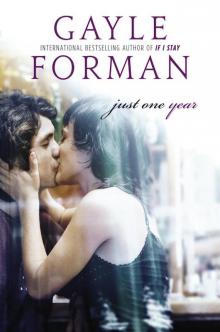 Just One Year
Just One Year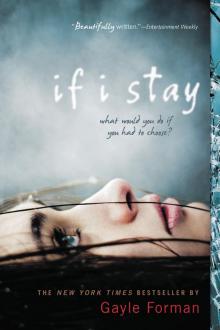 If I Stay
If I Stay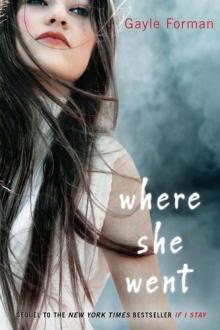 Where She Went
Where She Went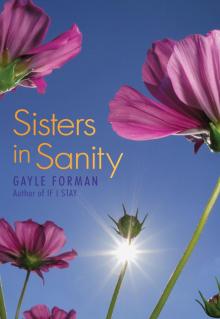 Sisters in Sanity
Sisters in Sanity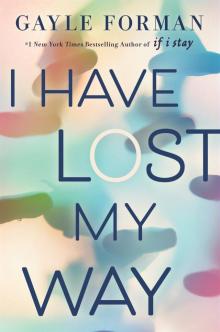 I Have Lost My Way
I Have Lost My Way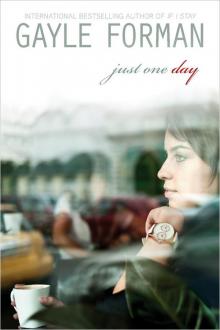 Just One Day
Just One Day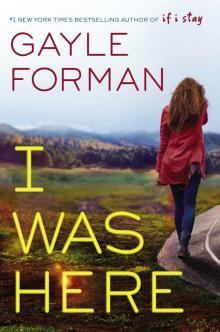 I Was Here
I Was Here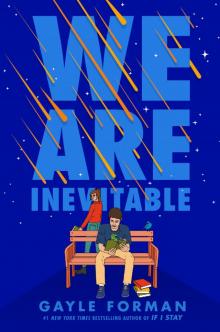 We Are Inevitable
We Are Inevitable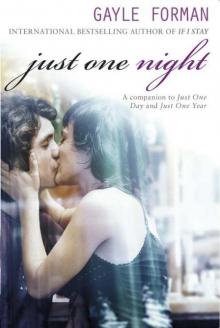 Just One Night
Just One Night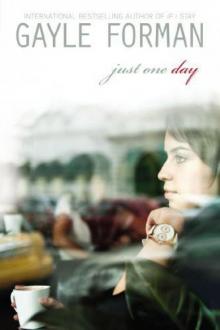 Just One Day jod-1
Just One Day jod-1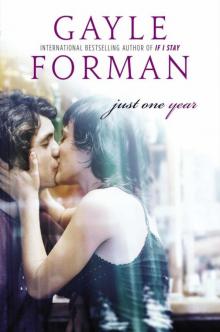 Just One Day 02: Just One Year
Just One Day 02: Just One Year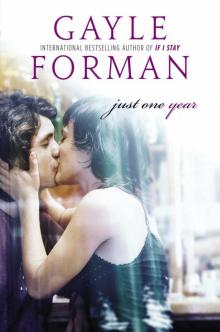 Just One Year jod-2
Just One Year jod-2